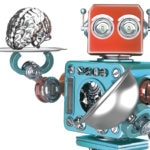Artificial intelligence: when technology replaces intuition
The possibility of obtaining more efficient algorithms than people is not science fiction. It’s an area of work that has recently been making major progress and is now being applied to the financial industry, as confirmed at the roundtable on artificial intelligence and machine learning at the last IIF Spring Meeting’s, held in Madrid and sponsored by BBVA.

“In the long term, we will have machines that are much more intelligent than people,” reported without hesitation Shamil Chandaria, senior advisor at Google Deep Mind, the British artificial intelligence company the search engine acquired in 2014. “We are trying to get logic programming to work like a brain and go far beyond searches. Algorithms already understand how to create intelligence,” noted Chandaria. He feels that major progress has been made in this field in recent years due to the great speed with which computer processing capacity has increased and the amount of accessible data.
“With deep learning we have managed to get programs to learn. The first step was developing the capacity to interact and understand. The next step is for them to make decisions,” said Jean Philippe Desbiolles, Vice President of Cognitive Solutions at IBM Watson Group, the blue giant’s artificial intelligence platform that operates with natural language and is able to learn from experience.
The different initiatives developed with Watson, which has open APIs to allow third parties to experiment with them, are a clear example of this technology’s potential.
Watson, much more than elementary
Watson has succeeded in learning eight languages, understanding complex questions, analyzing unstructured data and is able to offer different solutions to the questions users ask.
There are many different projects based on Watson including an oncological platform to offer treatment options based on a specific patient’s medical report; advisory systems to plan trips and make recommendations to new students at Deakin University; and a project to support financial decisions at ANZ Bank.
“These new technologies are a unique opportunities to reconsider processes and be more effective. It is also an opportunity for the regulator,” maintained Ayasi founder Gurjeet Singh, who feels that the automation of the banking industry is a fact. “The only question is how long it will take and then, as occurred with industrialization, we will have to find new jobs that add new value,” he noted.
IIF participants agreed that the specialized jobs of traders and asset managers will completely change. According to these experts, machine learning has enormous potential in this field, thanks to both its ability to analyze and understand a volume of information that a person could never process, as well as the elimination of subjective factors that influence decisions like emotions, fear or cultural filters.
“There is a lot of intuition in human decisions. Machines will replace intuition with technology,” affirmed Shamil Chandaria who says that the advantages make up for the threat this represents to certain types of jobs. “We will be much more intelligent,” he concluded.